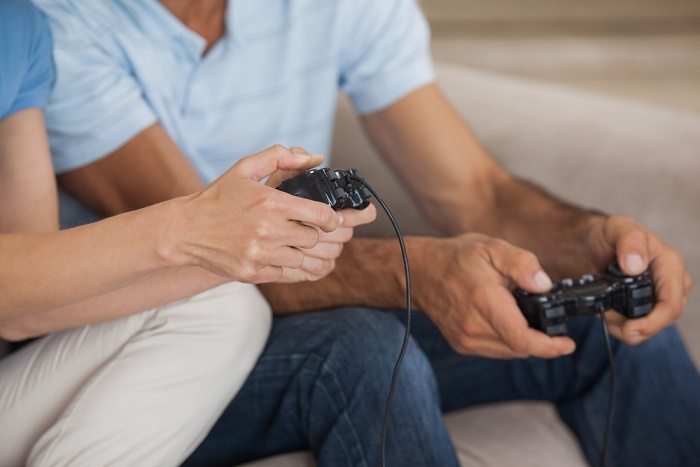Gaming Was Never a Safe Space for Women
GamerGate can and should act as the tipping point: a reminder for gamers that if they want their beloved pastime to survive, they have to work to embrace diversity rather than violently eschew it.

The term “GamerGate” may have been coined in the last few months, but the mob of reactionary, conservative gamers has appeared in headlines before. Two years ago, they responded with threats and toxic language to media critic Anita Sarkeesian’s Kickstarter for a web series that would critically examine the common portrayals of women in video games. Then, this August, a man implicitly accused his developer ex-girlfriend of sleeping with a journalist to garner positive reviews for her game. Though the claim was proven to be false, the developer faced a barrage of backlash—which, again, included insults, threats, and smear campaigns.
In both cases, gamers claimed that their extreme reactions were necessary in order to “protect” their hobby.
GamerGate may be the first time that sexism in gaming has come to the forefront of public conversation. But this misogyny is nothing new. Women have been facing toxicity within the gaming community for as long as the community has existed. GamerGate can and should act as the tipping point: a reminder for gamers that if they want their beloved pastime to survive, they have to work to embrace diversity rather than violently eschew it.
Gaming was never a boy’s hobby in my family. I have been playing games ever since I could hold a controller steady enough to do so. My earliest memories with them involved watching my mother play Super Punch-Out!! or helping my sisters with puzzles in The Legend of Zelda: Ocarina of Time. I could beat my male cousin in any Super Nintendo game I owned. I tried to teach my dad how to play Madden NFL ’95, but he couldn’t get the controls right.
It wasn’t until high school, when I encountered gamers who weren’t my relatives, that I realized female players were outnumbered. When I told guys at school I played games, they said I was “not like other girls,” because they saw hobbies like Halo as a masculine trait. I started playing games online with strangers who would ask, based on my female character, if I was really a girl. If I responded truthfully, the other player would start flirting with me, send in-game marriage requests, or demand to know whether I was a “real gamer,” because the idea of a girl knowing how to play games was so foreign.
Or worse, I’d face harassment. If I died during a group mission, I was a bitch. Or I should have been “in the kitchen making a sandwich.” I once played a game of Saints Row IV with a random stranger because it had achievements that required me to play with someone else, and I didn’t know anyone in real life who could help. When he realized my gender, the stranger started sending increasingly obscene messages. Eventually I had to block him.
I continue to play games online because gaming is what I love to do, and I have a thicker skin than most people. But because of behavior like this, many women refuse to play games online. It’s a brutal space, in which everyone is masked by an anonymous username and it’s rare for anyone to defend you. It feels like an emotional death wish.
The late Roger Ebert once said that games were not art, and could never be so. We’ve moved, however, from pixelated 2-D figures to cinematic 3-D worlds—not just artistic, but also engaging, compelling, and, yes, increasingly inclusive of women. Unfortunately, those behind GamerGate are regressing instead, refusing to accept where gaming is going. As we continue to prove critics like Ebert wrong, we must not let GamerGate’s supporters hold us, and our hobby, back. Gamers have fought to prove that the violence in certain games was part of its creative expression. Gamers fought to prove it’s possible to be physically healthy and still play often. Now we are fighting to prove that not all of the gaming community is sexist.
In that respect, GamerGate has been a blessing and a curse. The harassment targeted toward specific women is frightening and should never be experienced by anyone. But it’s also brought widespread attention from gamers, developers, and cultural critics to the kind of sexism in games that women like me are no stranger to. Even those who claim that GamerGate is about “ethics in journalism” have to see that ignoring the abusive tactics of some people in their “movement,” and in their gaming lives, is putting gaming in far more danger than any so-called media corruption.
Players should be able to participate online without feeling like their identity makes them vulnerable to threats or harassment. It may be easy to dismiss someone as a troll, particularly when their actions don’t affect you directly, but those trolls are as much gamers as I am, and they will continue to plague our culture until they’re stopped. As a community, we all—including those of us in no danger of harassment—have to actively fight back against this kind of abuse, and in turn, demand an environment from developers and marketers that challenges the status quo and combats sexism on a systemic level. This includes having more diverse roles for female characters, encouraging female developers to create games, and, perhaps most of all, welcoming female gamers as ordinary gamers.
This goes farther than giving female developers and female media critics peace. This means changing attitudes toward female players, so that their would-be safe haven can actually feel like one.
